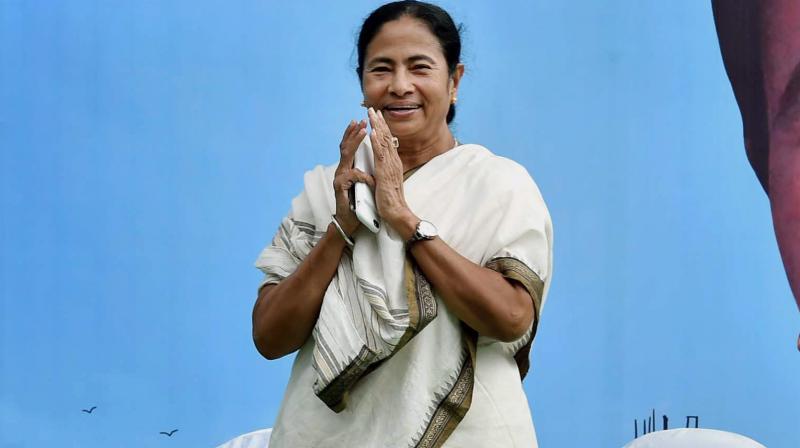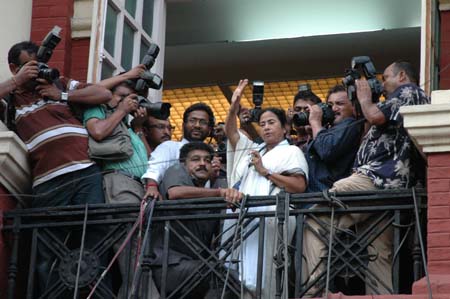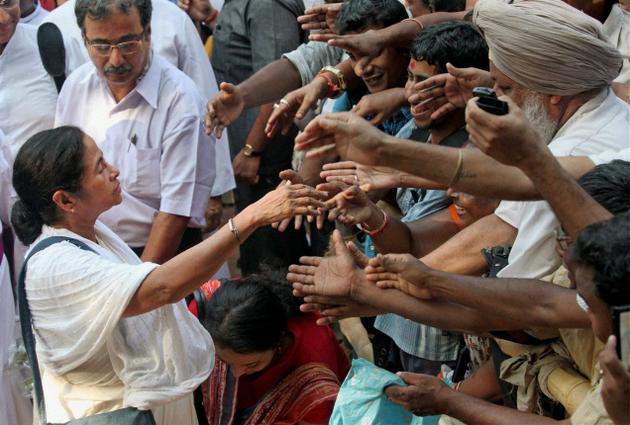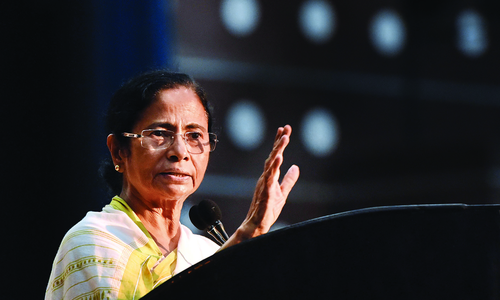After coming to power in 2011, Chief Minister Mamata Banerjee and her Trinamool Congress Government have created a whole host of developmental schemes for the people of Bengal. As a result, the state has seen progress like never before.
As Maa, Mati, Manush Government completes seven years, let us take a look at 20 schemes that have transformed Bengal in the last seven years:
1. Kanyashree
One of the landmark programmes of the Trinamool Congress Government, the Kanyashree Prakalpa, launched in 2013, is a scheme for empowering the girl child through enabling their education and thus, preventing their marriage at an early age. It has three components, names K1, K2 and K3, for those in school, after school and in post-graduation, respectively.
The scheme has brought more than 48 lakh adolescent girls under its fold covering over 16,600 institutions across every corner of Bengal.
2. Sabuj Sathi
Sabuj Sathi is a scheme, launched in 2015, for gifting bicycles to students of classes IX, X, XI and XII, both boys and girls, to make it easier for even those living in far-off places, to come to school and go back home conveniently. The green-coloured bicycles have noticeably improved attendance and have proved to be a tool of student empowerment, just like Kanyashree.
There have been 70 lakh beneficiaries (that is, 70 lakh bicycles have been distributed) till date.
3. Khadya Sathi
Through the Khadya Sathi Scheme, launched in 2016, the State Government is ensuring food security for the people of the state, the hallmark of the scheme being giving 5 kilogram (kg) of rice or wheat per family member per month at Rs 2 per kg. There are special arrangements under this scheme for those below the poverty line, affected by the Cyclone Aila, working in tea gardens, living in the Jangalmahal region, those in Singur whose farmlands were snatched away for setting up industries by the Left Front Government, and a few other categories.
8.66 crore people, comprising about 90.6 per cent of the state’s population, have been covered under this scheme.
4. Sabujshree
Sabujshree is an innovative scheme which connects two noble causes – protecting the environment and promoting girl children. Under the scheme, launched in 2016, the mother of a new-born girl child is handed over saplings for free to plant in some place where it can be taken care of – so the tree grows up under her care just like her girl child. 15 lakh seedlings have been distributed so far.
5. Shikshashree
Shikshashree is a scholarship scheme, begun in 2014, for scheduled caste (SC) category students from classes V to VIII. The scholarship is being paid directly into the bank accounts of the students. During financial years 2014-17, almost 38 lakh students were covered under this scheme.
6. Gatidhara
Through the Gatidhara Scheme, launched in 2014, the government provides loans of upto Rs 10 lakh on easy instalment basis to enable people to buy cars, small trucks, etc. for commercial use, with a subsidy of 30 per cent or up to Rs 1 lakh over the sanctioned loan while repaying the loan. Families with a monthly income of Rs 25,000 or less qualify for financial support under this scheme.
As of March 2017, the total number of beneficiaries covered is 13,393 and the amount of subsidy disbursed is Rs 125 crore.
7. Gitanjali
Gitanjali is a housing scheme, introduced in 2011, meant for providing shelter to people belonging to economically weaker sections (EWS). A grant of Rs 70,000 is provided to a beneficiary in the plains whereas Rs 75,000 is provided to a beneficiary from the Hills region, the Sundarbans and Jangalmahal.
Till March 2017, benefits have been extended to 2 lakh 98 thousand 745 families.
8. Lok Prasar Prakalpa
The scheme, Lok Prasar Prakalpa was started in 2014 to rejuvenate the folk arts of Bengal coupled with the aim of disseminating social messages and information on the various developmental schemes run by the State Government. Folk artistes between 18 and 60 years of age receive a retainership fee of Rs 1,000, and in addition an opportunity for four performances per month, with Rs 1,000 paid for each. Senior artistes, that is, those above 60, receive a similar sum as monthly pension.
As of March 2017, benefits have been extended to nearly 1.94 lakh folk artistes.
9. Fair Price Medicine Shops
The purpose of Fair Price Medicine Shops (FPMS) or (in Bengali) ‘Najyamuller Aushadher Dokan’, first established in 2012, is to ensure round-the-clock availability of quality medicines, consumables, surgical items, implants, etc. at pre-approved discounted rates over the maximum retail price (MRP), to enable people from all economic backgrounds to buy them. These types of medicine shops are located at State Government-run hospitals and medical college-cum-hospitals.
Till March 2017, 112 Fair Price Medicine Shops have been set up, selling goods at discounts of 48 to 78 per cent on the MRP. As of December 2016, the total sales have been Rs 1,331 crore and patients availed discounts worth Rs 829 crore, with 2.93 crore prescriptions being served from these facilities.
10. Shishu Sathi
Shishu Sathi Prakalpa is a programme which was launched (in 2013) for providing free-of-cost operations for children up to the age of 18 years, covering the treatment of congenital cardiac diseases, cleft lip/palate and club foot. It is available at all State Government hospitals having paediatric facilities and at three private hospitals, namely, RN Tagore International Institute of Cardiac Sciences, BM Birla Heart Research Centre (both in Kolkata) and Durgapur Mission hospital.
About 12,000 children have received treatment through this scheme, so far.
11. Shishu Aloy
Shishu Aloys, launched in 2012, are a type of advanced Anganwadi Centres, aimed at making children ready for school at the age of 6 years. Here, children are prepared for schools in every possible way as well as provided with nutritious food; they also get medical assistance.
As of March 2017, 2,000 Shishu Aloys were developed across all districts and two more at the Dum Dum and Alipore Correctional Homes to facilitate children of inmates. On November 25, 2017, which is celebrated by the State Government as Shishu Aloy Dibas, 10,000 more Shishu Aloys were inaugurated across Bengal.
12. Pathasathi
The project consists of developing wayside facilities for travellers on national and state highways and other important roads, named ‘Pathasathi’, run by self-help groups, societies, West Bengal Tourism Development Corporation (WBTDC) or certain designated agencies. Each of these has a bathroom, a passenger’s waiting room, family rooms and a restaurant. A total of 67 such facilities are being constructed.
13. Swasthya Sathi
Swasthya Sathi, announced in 2016, is a cashless group health insurance scheme (that is, including families) for all those employed by the State Government’s departments, both permanently and part-time. It is meant for various categories of employees like panchayat functionaries, para-workers like ASHAs, anganwadi workers and civic police volunteers, contractual, part-time and daily wage earners under various departments, teachers and non-teaching staff of primary schools, secondary schools and government-aided madrasahs, and others.
As of March 2017, there were more than 35 lakh beneficiaries and their families enrolled. Later, in September, the benefits were extended to include a total of 55.5 lakh more government employees and volunteers and their families.
14. Sabala
Sabla is a scheme, begun in 2011, for adolescent girls, which aims to improve the nutritional and health status of girls between 11 to 18 years of age and equip them with life skills training and knowledge on family welfare, health and hygiene, and information and guidance on existing public services. It is being implemented on a pilot basis in seven districts namely, Cooch Behar, Jalpaiguri, Alipurduar, Malda, Nadia, Kolkata and Purulia through 29,444 Anganwadi Centres from 141 ICDS projects.
The benefits of the Sabla Scheme have reached 12.72 lakh girls between the ages of 11 and 18 years.
15. Anandadhara
The Anandadhara Scheme, initiated in 2012, is an anti-poverty programme for the rural poor, implemented through the organising of women into self-help groups (SHG). The number of blocks involved in the programme has increased from 32 during financial year 2012-13 to 158 during 2016-17, and consequently, the number of SHGs has increased from 3.18 lakh to 4.58 lakh, respectively. During 2016-17, the credit accessed from banks was Rs 3,329.81 lakh, against a target of Rs 3,274.9 lakh (101.68%)
16. Yuvashree
Yuvashree was launched in 2013 to extend financial assistance of Rs 1,500 per month to 1 lakh of the job seekers registered in the employment bank portal, launched earlier by the government, selected on the basis of criteria like education (those who have passed at least eighth standard) and age group (beneficiaries must be in the age group of 18 to 45 years). The recipients of the allowance are required to use it for training, vocational or otherwise, which will make them fit for employment.
17. Samabyathi and Baitarani
Samabyathi is a scheme, notified in 2016, for providing money to the next of kin of poor people in rural regions for organising their funerals. Rs 2,000 is paid disbursed per funeral. Since the introduction of the programme, 25,478 households have been benefited by this initiative and a sum of Rs 5.1 crore has so far been disbursed.
18. Swabalamban
Swabalamban is a scheme implemented through NGOs and companies for imparting vocational training to socially marginalised and distressed women, victims of trafficking, sex workers, the transgender community and women in moral danger, in the age
group of 18 to 35 years; if necessary, the upper age limit for such category of women is relaxed up to 45 years.
Beneficiaries successfully placed at renowned outlets like Wow Momo, Pantaloons, Kothari, Au Bon Pain and others. Thirty Kanyashree beneficiaries have been trained under the Swabalamban Scheme by Brainware as unarmed security guards, out of whom 16 have been successfully placed in different organisations.
19. Khelashree
The Khelashree Scheme, inaugurated in 2017, is a developmental initiative to encourage sporting activities. As per the scheme, Madhyamik and Higher Secondary schools, High Madrasahs, colleges, universities, all clubs from the first to the fifth divisions of the Kolkata League and all clubs and sports institutions which have been getting annual financial aids from the State Government, would be given five footballs each.
20. Safe Drive Save Life
The Safe Drive Save Life programme was started in 2016 to bring down road accidents in the State. It has been appreciated by the Supreme Court recently.
As a result of the programme, the number of road accidents in the state has reduced by 19.52 per cent. Naturally, the number of deaths and cases of injury have also come down by 11.5 per cent and 14 per cent, respectively.
Special Mention – Mission Nirmal Bangla
Bengal has constructed the most number of toilets as well as used up the highest amount of funds for constructing toilets. In 2013, Nadia became the first ODF district in India. The state reported 21,324 villages as ‘Declared ODF’, covering 1,929 GPs, till May 17, 2017, which is the highest in the country.
This initiative of the State Government achieved international recognition when it was selected as the first place winner for the 2015 United Nations Public Service Award in the category of ‘Improving the Delivery of Public Services’.












